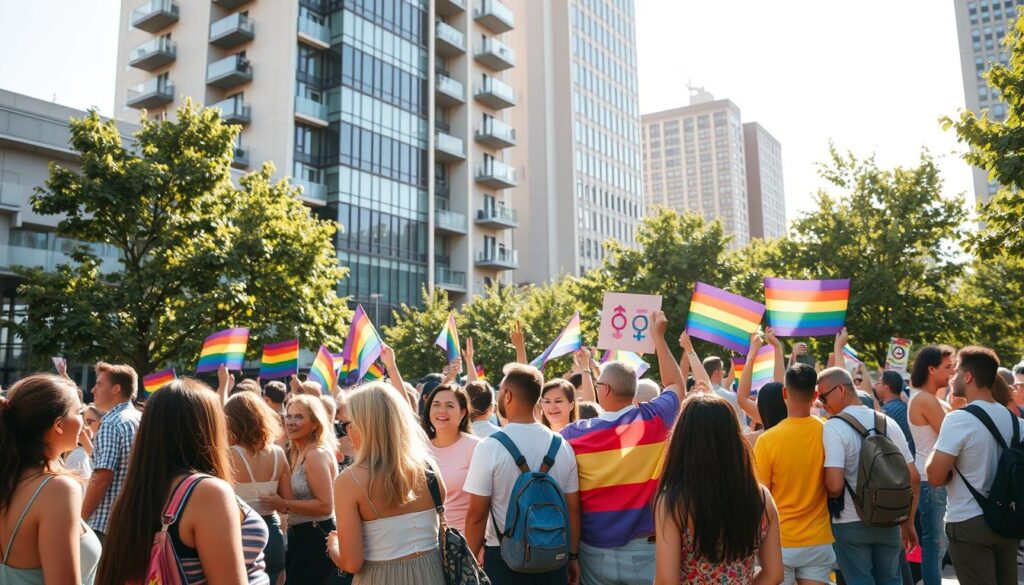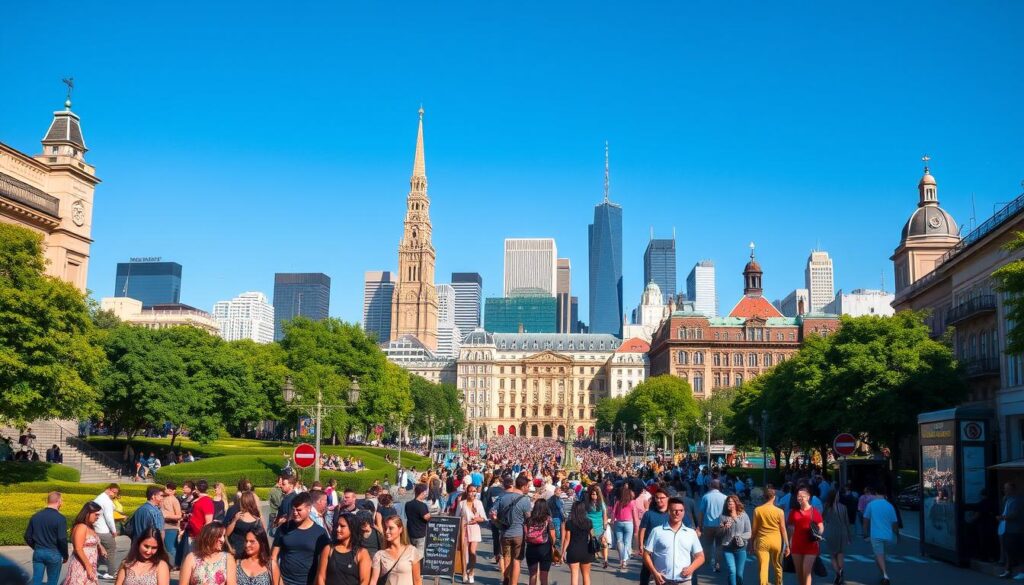Last Updated on: 3rd February 2025, 03:34 pm
With increasing awareness about transgender rights, many individuals are now exploring opportunities to relocate to more affirming environments. The surge of anti-LGBTQ+ legislation in the United States has become a significant catalyst, prompting transgender expats to seek safe havens abroad. Countries like Malta, which scored an outstanding 90.29% in the recent rankings by the International Lesbian, Gay, Bisexual, Trans & Intersex Association, stand out for their commitment to inclusivity1. The situation is compounded, as over 500 anti-trans bills are currently active in the U.S., including 83 that were passed in 20232. This environment drives the urgency to find LGBTQ+ friendly nations where legal protections and social acceptance are prioritized.
Through comprehensive research, including insights from travel experts, we’ve identified the Best Countries For Transgender Expats that excel not only in laws and protections but also in community support. This article will delve into various nations that are paving the way for improved transgender rights and healthcare access, providing a clearer picture of potential destinations.
Key Takeaways
- Transgender individuals are increasingly relocating to countries with affirming laws and support systems.
- The rise of anti-LGBTQ+ legislation in the U.S. is prompting many to seek safer alternatives.
- Countries like Malta and Canada offer robust protections for transgender rights.
- Healthcare accessibility varies significantly across nations, impacting transgender expats.
- Communities play a crucial role in supporting transgender individuals in their new environments.
Contact us if you are Interested in Buying Property Abroad!
Why Transgender Expats Are Seeking Safe Havens
The increasing number of anti-trans bills in various regions has left many transgender individuals feeling unsafe and marginalized. With over 566 anti-trans bills proposed in 2023 across 49 states, the emotional well-being of LGBTQ+ individuals has been seriously jeopardized, with 80 of these bills enacted without veto3. In a world where only 68 countries allow a legal change of gender on identification documents, the need for safe havens for transgender expats cannot be overstated4. Countries like Canada, Sweden, and Portugal have emerged as top choices for those seeking refuge from environments that inhibit their rights and identities5.
Many expats intentionally choose safer destinations, which are not only welcoming but also inclusive. Such safe havens for transgender expats often provide legal protection and access to necessary healthcare services, contributing to a supportive community environment. For instance, nations like Malta and Iceland emphasize LGBTQ+ safety through comprehensive legal frameworks and policies that promote acceptance and equality5.
In stark contrast, countries with restrictive laws create an environment that can be detrimental to emotional well-being. Countries like Brazil and Mexico have recorded high murder rates for transgender people, creating urgency for individuals to seek safer living situations4. As individuals look for communities that nurture and affirm their identities, the importance of recognizing these safe havens becomes ever more significant.
Understanding Transgender Rights Worldwide
The global landscape of transgender rights is profoundly varied, affecting the safety and quality of life for transgender individuals. Different countries adopt distinct approaches to global transgender rights and LGBTQ+ legislation, leading to significant disparities. For instance, Canada is renowned for robust support systems for transgender students, particularly at esteemed institutions like the University of Toronto and the University of British Columbia6. Denmark allows transgender individuals to change their legal gender through a straightforward administrative process, fostering inclusive environments in universities such as the University of Copenhagen6. The United Kingdom has implemented legal protections against discrimination, with universities like the University of Oxford actively promoting inclusivity6.
Over 20 countries have passed legislation recognizing transgender rights, signaling a progressive shift globally7. Countries like Argentina and Denmark have emerged as leaders in gender recognition reform, while 34 countries in Europe still impose surgical requirements for name and gender changes7. The situation in other regions can be dire, such as in Iran, where only individuals who undergo complete gender reassignment surgery are recognized7. The landmark 2014 Supreme Court ruling in India that allows transgender individuals to self-identify without surgery marks critical progress in gender identity laws7.
The complexities extend into the realm of safety, highlighted by disturbing statistics; from 2008 to 2016, a staggering 2,264 killings of trans and gender-diverse people were reported globally7. Countries like Malta showcase strong legal protections, ranking first in transgender rights, outlawing hate crimes, and not requiring medical transitioning for gender changes8. In contrast, Guyana presents a picture of hostility, ranking as the worst country for transgender individuals due to rampant discrimination and violence8.
Understanding these various contexts is crucial for expats contemplating relocation. Decisions rooted in informed evaluations of global transgender rights can lead to safer and more supportive environments for transgender individuals worldwide.
Best Countries For Transgender Expats

Finding a suitable environment for transgender expats involves looking at various factors such as legal rights and social acceptance. The best countries for transgender expats not only demonstrate robust frameworks for LGBTQ+ rights but also foster inclusivity in social settings.
Canada: A Leader in LGBTQ+ Inclusion
Canada stands out for its comprehensive approach to LGBTQ+ inclusion. Since legalizing same-sex marriage in 2005, the nation has been recognized as one of the best countries for expats. With a high ranking on the Asher and Lyric 2023 Danger Index, Canada scores 383, making it the safest country for the LGBTQ community9. The government has enacted laws providing strong protections against discrimination for transgender individuals, affirming its commitment to human rights6.
Sweden: Longstanding Commitment to Gender Equality
Sweden has a deep-rooted history in promoting gender equality and LGBTQ+ rights. Legal recognition for same-sex marriage was granted in 2009, and anti-discrimination laws have been in place since the 1980s. Despite recent growing concerns regarding restrictions for transgender minors, the nation’s overall acceptance of diversity remains strong, marking it as a favorable destination for transgender expats10.
Malta: Top Ranking for Transgender Rights
Malta emerges as a forerunner in respecting transgender rights, boasting a remarkable score of 90.29% on human rights recognition. The legal framework allows for seamless gender recognition, ensuring that transgender individuals can live authentically without unnecessary barriers. This progressive stance contributes significantly to Malta being regarded as one of the best countries for transgender expats10. Moreover, Malta’s vibrant LGBTQ+ community provides a supportive social environment for newcomers.
| Country | LGBTQ+ Marriage Legalization | Transgender Rights Support | Overall Safety Ranking |
|---|---|---|---|
| Canada | 2005 | Strong Protections | 1 |
| Sweden | 2009 | Established Anti-Discrimination Laws | Varies |
| Malta | 2017 | Seamless Gender Recognition | Varies |
The combination of legal protections, healthcare access, and social acceptance in Canada, Sweden, and Malta underscores their reputation as the best countries for transgender expats. By understanding these landscapes, individuals can make informed decisions about their relocation options. For additional insights into LGBTQ-friendly countries, refer to this helpful resource.
Contact us if you are Interested in Buying Property Abroad!
Transgender Healthcare Accessibility

Accessibility to transgender healthcare plays a crucial role for those considering relocation. Canada stands out with its universal healthcare system, which includes comprehensive coverage for gender-affirming surgeries and therapies, exemplifying the Canada healthcare model. According to recent data, around 34% of trans people across all member states of the European Union reported facing discrimination by healthcare workers based on their gender identity11. In stark contrast, Sweden’s evolving gender identity laws present a more complicated landscape, impacting access for individuals seeking care.
Healthcare In Canada: A Model for Other Nations
Canada’s approach provides a benchmark as its healthcare system supports trans individuals through timely access to necessary services. The Trans Health Map ranks countries based on various factors, where Canada received high marks for integrating transgender healthcare seamlessly into its national system. In Malta, a trans-specific healthcare model based on self-determination and informed consent has shown promising results, contrasting with the longer waiting times reported in other countries. In Ireland, individuals face waiting times exceeding seven years to see a healthcare professional for trans-specific needs11.
Sweden’s Evolving Gender Identity Laws
In Sweden, access to gender-affirming healthcare has unique challenges. There are seven locations equipped with gender assessment teams to provide essential healthcare services, yet the waiting time for the first meeting can extend up to two years12. Gender-affirming care encompasses hormone treatment and surgery, specifically designed for individuals experiencing gender dysphoria. Hormone treatment is funded by the public healthcare system, requiring a diagnosis of gender dysphoria while procedures such as top or bottom surgery necessitate collaboration with a gender assessment team, often after a lengthy waiting period12.
| Country | Universal Healthcare | Waiting Times for Treatment | Gender Assessment Locations |
|---|---|---|---|
| Canada | Yes | Variable | N/A |
| Sweden | Yes | Up to 2 years | 7 |
| Ireland | Yes | Over 7 years | N/A |
| Malta | Yes | Variable | N/A |
Understanding these healthcare dynamics is essential for informing individuals about their choices while considering relocation for better access to transgender healthcare. While Canada offers a robust model, Sweden’s ongoing legislative developments require observance and analysis.
The Role of Progressive Policies

Progressive policies are instrumental in fostering transgender acceptance and ensuring LGBTQ+ rights in various countries. These policies help create environments where LGBTQ+ individuals can thrive without fear of discrimination. For instance, Canada has been recognized as the safest place for LGBTQ travelers, scoring highest on the 2023 LGBTQ Travel Safety Index. This ranking reflects Canada’s effective progressive policies that not only support same-sex marriage, legalized in 2005, but also maintain a remarkably low rate of trans murders, at just 0.24 per million over the past decade13.
*Countries like Belgium and Denmark have established themselves as champions of equality through comprehensive legislation supporting LGBTQ+ rights. Belgium, having legalized same-sex marriage in 2003, showcases high societal acceptance, with 84% of the population in support of these policies9.
In Denmark, recognized for its initial legalization of same-sex unions in 1989, vibrant events like Copenhagen Pride symbolize successful community mobilization that propels further reforms9. Events celebrating LGBTQ+ culture and heritage often catalyze necessary legislative changes, as seen in various Pride celebrations across Europe.
Countries that implement such progressive measures tend to educate the public on LGBTQ+ issues, promoting dialogue and understanding. This contributes to creating a culture of respect and acceptance, vital in combating biases that persist. It is crucial to note that while progressive policies flourish in certain nations, others still face legislative challenges, highlighting the ongoing journey toward equality for all10.
Safe Transgender Travel Destinations in 2025

Traveling safely is of utmost importance for transgender individuals looking to explore new countries. With the evolving landscape of Portugal LGBTQ+ rights and Spain LGBTQ+ acceptance, both nations emerge as promising options for transgender travelers.
Portugal: Balancing Progress with Challenges
Portugal is celebrated for its progressive marriage and adoption laws, making it a progressive haven in Europe. Though the country has achieved significant milestones, challenges persist. Many rural areas still exhibit signs of lingering homophobia, which can affect the overall experience for transgender travelers. For those visiting, understanding local attitudes is key to ensuring a safe journey in this beautiful country.
Spain: A Welcomer of LGBTQ+ Communities
Spain stands out with recent advancements in legislation supporting transgender and non-binary individuals. This vibrant nation not only embraces diverse lifestyles but offers a variety of festivals and events celebrating LGBTQ+ culture. Travelers can find an inclusive environment particularly in cities like Madrid and Barcelona, where community support enhances the experience. With its comprehensive laws and societal acceptance, Spain is considered one of the top safe transgender travel destinations.
For more information on global rankings for LGBTQIA+ friendly travel, check out this detailed index which outlines a broader perspective on safe transgender travel destinations14.
Contact us if you are Interested in Buying Property Abroad!
Inclusive Societies: The Importance of Community Support

Community support plays a crucial role in fostering inclusive societies, especially for transgender expats navigating new environments. In the Netherlands, a pioneering force in LGBTQ+ acceptance, the rich history of social policies has created welcoming spaces. This progress reflects a commitment to enhancing the lives of LGBTQ+ individuals.
The Netherlands: A History of LGBTQ+ Acceptance
The Netherlands LGBTQ+ history is marked by significant milestones, including the first legal same-sex marriage in 2001. This commitment to equality has paved the way for various support networks that empower transgender individuals. Community support structures facilitate connections and provide essential resources, contributing positively to mental well-being.
Norway: Celebrating Diversity with Pride Month
Norway has established itself as a champion of inclusive societies, particularly visible during Norway Pride Month. This annual event not only celebrates diversity but also strengthens community support for LGBTQ+ individuals. It fosters an environment where acceptance thrives, enhancing the overall experience for expatriates living in Norway.
In summary, the efforts of countries like the Netherlands and Norway underscore the significance of community support in building inclusive societies. These initiatives not only foster acceptance but actively transform the lives of transgender individuals. Creating inclusive environments leads to healthier communities and enriches the experiences of expatriates. Such environments showcase the profound impact of supportive societal frameworks on the well-being of all15.
Resources Available for Transgender Expats

Finding appropriate resources for transgender expats is crucial for easing the transition to a new country. An array of LGBTQ+ support services exists to assist individuals in navigating their new environments effectively. These services include legal advocacy groups, healthcare resources, and community networks dedicated to supporting the LGBTQ+ community.
International LGBTQ+ organizations play a pivotal role in offering guidance and assistance tailored to expatriates. They provide essential information regarding local laws, healthcare access, and community connections. For instance, organizations like ILGA and OutRight Action International help individuals understand their rights and connect them with local support networks.
For healthcare, various resources are available that outline how to find competent medical professionals familiar with transgender issues. Countries such as Canada allow residents to change their identity legally without requiring surgery16. Malta has seen progressive changes, having passed an act that promotes gender identity without the need for a diagnosis in 201516. These progressive policies provide a supportive backdrop for newcomers seeking medical care.
Furthermore, local expat communities often offer invaluable advice on adapting to life abroad. Platforms where individuals can share experiences and tips about daily living in foreign environments contribute positively to their relocation experience. Such connections not only provide support but also help build a sense of belonging within the new locale.
The role of online platforms cannot be underestimated; these spaces facilitate networking among transgender individuals worldwide. They allow for crucial exchanges of information, which enhance the knowledge base concerning resources for transgender expats. As more expats share their personal experiences, prospective newcomers have access to advice about transitioning smoothly into their new surroundings.
Challenges Faced by Transgender Expats
Transgender expats encounter various obstacles that can impact their quality of life and sense of security. The rising anti-trans legislation trends highlight a significant challenge as many countries enact laws that threaten transgender rights. This creates an environment that often feels antagonistic, leading to increased apprehension and uncertainty among those considering expatriation.
Current Anti-Trans Legislation Trends
Countries worldwide are seeing a surge in legislative efforts aimed at restricting transgender rights. For instance, Thailand has recently made milestones with its same-sex marriage bill, reflecting a shift in public and political attitudes17. Conversely, numerous other nations continue to push laws that undermine protections for transgender individuals. An alarming trend is evident where bills targeting transgender youth’s access to healthcare and activities are becoming more common, fostering a chaotic landscape for transgender expats.
Public Perception and Hate Crimes
The public perception of LGBTQ+ individuals also plays a crucial role in shaping the lives of transgender expats. Various studies indicate that acceptance levels fluctuate significantly around the globe. For instance, nine in 10 Thai people express acceptance of LGBT+ individuals18. Unfortunately, in many regions, rising hate crimes against transgender people reflect deep-seated issues within society, further aggravating the challenges for transgender expats to live freely and securely.
| Country | Year of Same-Sex Marriage Legalization | Public Acceptance of LGBT+ |
|---|---|---|
| Thailand | 2025 | 90% |
| The Netherlands | 2001 | Varied by region |
| Belgium | 2003 | High, generally supportive |
| Spain | 2005 | Very high acceptance |
| Malta | 2017 | Strong support observed |
Conclusion
As we look toward the future, the topic of safe living for transgender individuals is more critical than ever. The exploration of LGBTQ-friendly countries highlights not only the remarkable progress achieved in places like Canada, Portugal, and Spain, but also underscores the persistent challenges in the global landscape of transgender rights. Countries that prioritize inclusivity and offer robust legal protections create an environment that fosters acceptance, a vital aspect for transgender expats seeking stability and belonging.
Recognizing that the fight for equality is ongoing is essential. Advocacy efforts are necessary to ensure that hard-earned rights are not eroded, particularly in light of rising anti-trans sentiment globally. By spotlighting nations with strong protections and supportive communities, we pave the way for a brighter global LGBTQ+ future, which is essential for promoting further progress and understanding.
Ultimately, the collective responsibility to nurture acceptance and inclusion is paramount. As highlighted throughout our discussions, these aspects not only benefit transgender individuals but enrich societies as a whole. For more insight into LGBTQ-friendly nations and the evolving landscape of rights for transgender expats, you can visit this resource19.
Contact us if you are Interested in Buying Property Abroad!
FAQ
What are the best countries for transgender expats in 2025?
Why are transgender expats seeking safe havens abroad?
How can I find resources available to support transgender expats?
What challenges do transgender expats face in foreign countries?
How does healthcare accessibility differ for transgender individuals in different countries?
What role do progressive policies play in supporting transgender rights?
Are there travel destinations that are particularly safe for transgender individuals?
How important is community support for transgender expats?
How are transgender rights monitored worldwide?
What recent advancements have been made in transgender rights globally?
Source Links
- https://rainbowrelo.com/blog/top-20-best-countries-to-move-for-lgbtq-expats-in-2024
- https://www.forbes.com/sites/laurabegleybloom/2023/06/27/new-lgbtq-safety-report-ranks-trans-friendly-travel-destinations/
- https://expatsi.com/communities/lgbtqia/safe-countries-for-trans-kids/
- https://www.expat.com/en/expat-mag/10092-understanding-global-challenges-and-safe-havens-for-transgender-expats.html
- https://jessicadrucker.com/blog/2022/8/12/where-can-lgbtq-folks-safely-move-abroad
- https://studyabroad.ucmerced.edu/content/5-study-abroad-countries-stronger-transgender-rights-usa
- https://www.cnn.com/2017/02/23/health/transgender-laws-around-the-world/index.html
- https://travelnoire.com/best-worst-countries-for-trans-rights-2023
- https://www.globalcitizensolutions.com/most-lgbtq-friendly-countries/
- https://www.nbcnews.com/feature/nbc-out/15-best-countries-lgbtq-expats-n683201
- https://tgeu.org/trans-health-map-2022/
- https://www.rfsl.se/en/organisation/vard-for-transpersoner/transvaard/
- https://www.forbes.com/sites/laurabegleybloom/2023/03/07/most-homophobic-countries-lgbtq-friendly-gay-travel-dangerous-places/
- https://www.expat.com/en/expat-mag/10306-top-destinations-for-lgbtqi-plus-expats-safety-rights-and-social-acceptance.html
- https://williamsinstitute.law.ucla.edu/publications/lgbt-inclusion-economic-dev/
- https://rainbowrelo.com/blog/top-20-countries-for-trans-non-binary-international-relocation-in-2024
- https://en.wikipedia.org/wiki/LGBT_rights_in_Thailand
- https://www.expatica.com/global/moving/location/lgbt-friendly-countries-9880/
- https://visa-to-travel.com/news/the-ten-most-lgbtq-friendly-countries
Best Countries According to Aparthotel.com
- Best Countries To Live In Europe
- Best Countries To Move To From Canada
- Best Country To Live In
- Top Birth Tourism Countries
- Cheapest Asian Country To Live In
- Cleanest Country In The World
- Countries With No Capital Gains Tax
- Countries That Allow Dual Citizenship
- Countries With No Income Tax
- Countries With No Inheritance Tax
- Countries With No Property Tax
- Easiest Countries To Move To From USA
- Easiest EU Country To Get Citizenship
- Hardest Countries To Immigrate To
- Highest Tax Paying Country
- Instant Citizenship Countries
- Least Corrupt African Countries
- Lowest Tax Countries
- Non Extradition Countries
- Safest Countries In Africa
- Safest Countries In Europe
- Safest Country In Asia
- Safest Country In The World
- Safest Latin American Countries
- Second Passport Countries
- Territorial Tax Countries
- Which Country Pays Highest Salary
- Most LGBT Friendly Countries
- Best Countries For Expats
- Best Countries for Work-Life Balance
- The Best Countries For Hiking Adventures
- Best Countries for Expat Healthcare
- Safest Countries For Women Travelers
- The Best Country For Safari Adventures
- Top Solo Travel Destinations for Adventure Seekers
- The Best Solo Trips For Women
- Best Countries For Disabled Veterans
- Top Countries for Plastic Surgery
- Top Countries for All Inclusive Resort Vacations
- Top Countries With The Best Food Worldwide
- Best Countries For Black Expats
- Top Countries for Education
- Best Places To Retire In The World
- Top Countries for Transgender Expats to Live
- Best Places For Passport Bros
- Top 10 Best Countries For Surfing
- Top Countries for Digital Nomads
- Top European Countries for English Speakers to Live
- Top Countries for Software Engineers to Thrive

As a passionate, global-thinking Real Estate Investor I am constantly looking for the best opportunities to invest in Properties. With Aparthotel.com I am building an All-In-One Global Real Estate Platform, where people can analyse, rent or invest in properties. Additionally I help Investors with comparing the best financing options as well as give detailed Consultation on the buying process for Real Estate Investments around the world. I am looking forward to sharing my knowledge on this Website and feel free to reach out to me if you have any questions.

Comments